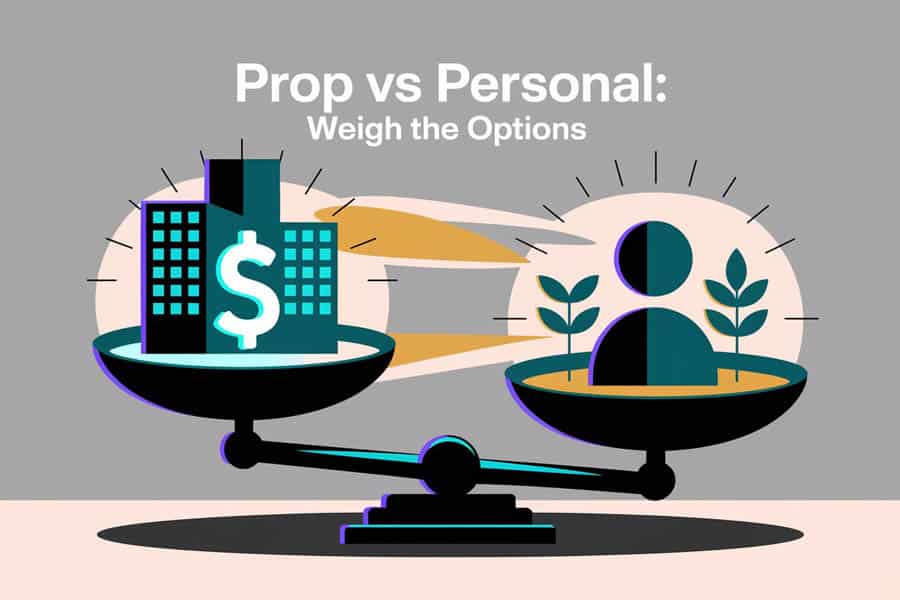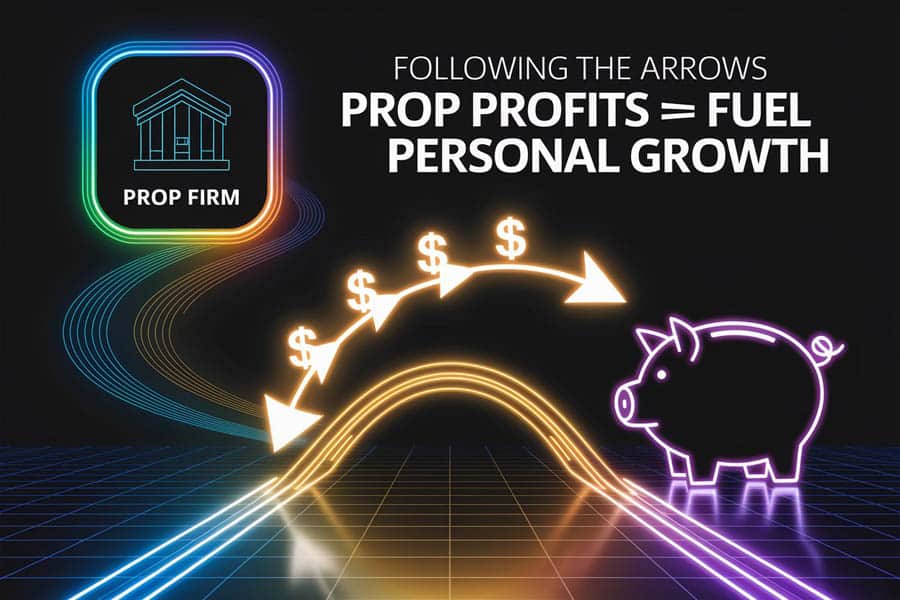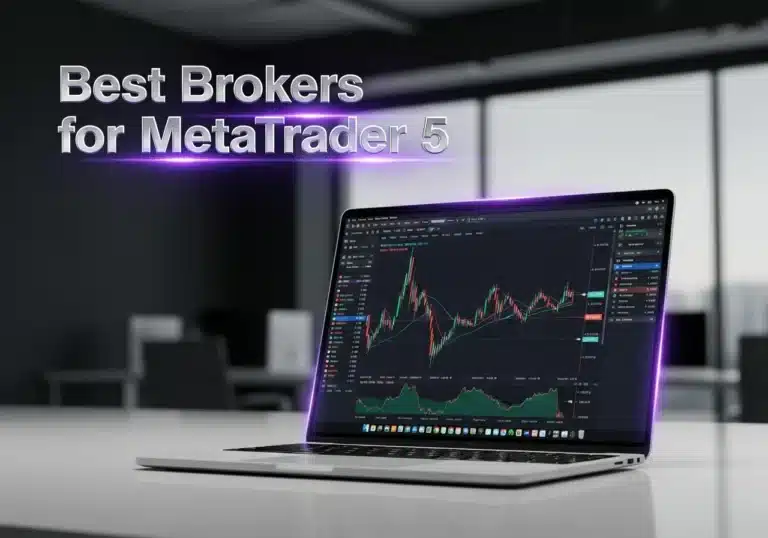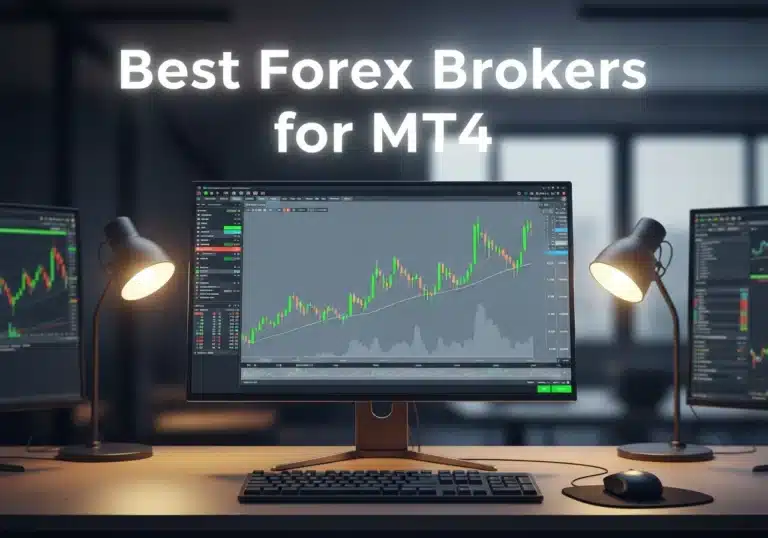So, you’re excited about trading and eager to succeed in the markets, right? But achieving consistent profits can often feel complicated. Many traders get bogged down deciding the best route: should you leverage a prop firm’s capital or diligently build your own trading account? It’s a frequent dilemma, especially when also searching for a trustworthy forex broker. This uncertainty can stall progress or push you towards a model ill-suited to your style or financial situation. This article aims to clear things up, directly comparing prop firm vs personal trading accounts. We’ll break down the real pros, cons, and vital distinctions, providing the insight you need to choose confidently and get your trading journey on the right track.

What is Prop Firm Trading?
Proprietary trading, or ‘prop trading’ as it’s often called (especially the online versions gaining popularity), offers a different approach compared to needing your own significant starting funds. Essentially, it means you trade using the company’s money, not your personal savings. It’s like being talent-scouted for your trading abilities. Prove you have the skills and discipline, and they provide substantial capital for you to trade with.

The Challenge Phase
Before trusting you with a large sum, these firms need solid proof you can consistently make profits while managing risk effectively. This usually involves passing an ‘evaluation’ or ‘challenge.’ You’ll typically trade in a simulated environment, aiming to hit specific profit targets (e.g., an 8-10% gain) without violating strict risk rules. Common rules include staying below a maximum loss allowed per day (like 5%) and an overall maximum loss limit (often 10-12% total). There’s generally a fee to enter this evaluation, which varies based on the account size you’re applying for. Successfully navigate this stage (and sometimes a follow-up confirmation phase), and you gain access to a funded account.
Funded Account Rules
Getting funded is a major milestone, but the rules don’t disappear. You must continue operating within the firm’s strict risk guidelines, which usually mirror the evaluation rules. Violating these (like exceeding the maximum drawdown) typically results in losing access to the funded account. Firms might also impose other restrictions, such as prohibiting trading during major news releases, holding positions overnight or through the weekend, or limiting which financial instruments or strategies you can employ. It’s their capital, so they set the boundaries.
Funding Levels & Profit Splits
Prop firms offer various account sizes, starting from around $10k-$25k and going up to $200k, $500k, or even higher via ‘scaling plans’ for consistently profitable traders. The key trade-off? You share the profits you generate with the firm. However, profit splits heavily favouring the trader are standard, such as 80/20 or even 90/10 (your share/firm’s share). Payouts are typically processed on a regular schedule, like bi-weekly or monthly, based on your performance.
Why Consider a Prop Firm? (Pros)
The significant interest in prop firms stems from tangible benefits they offer, particularly appealing to traders who have developed skills but lack substantial personal trading capital. Let’s explore the main attractions of this model.

Major Capital Access
This is arguably the most compelling advantage. Many talented traders work with personal accounts of just a few thousand dollars. A prop firm can potentially provide access to $100,000, $200,000, or more. Trading with significantly larger capital fundamentally changes the earning potential. A modest 5% monthly gain on $100k yields $5,000, vastly different from $100 on a $2k account. This access can bridge the gap, allowing skills to translate into meaningful income much sooner.
Lower Personal Financial Risk
Once funded, the money you’re trading isn’t directly yours. If you encounter a losing streak and hit the maximum drawdown, you lose the funded account, but your personal savings remain untouched. Your primary financial risk is generally confined to the initial evaluation fee. This separation can significantly reduce the psychological stress associated with risking personal wealth on every trade.
Higher Earning Potential (Despite Splits)
While you don’t keep 100% of the profits, the sheer scale of the capital often means your take-home earnings can be substantially higher than trading smaller personal funds. For instance, taking home 80% of a $5,000 profit ($4,000) from a $100k funded account drastically outperforms keeping 100% of a $100 profit from a $2k personal account, assuming the same percentage gain. For capable traders, the leverage provided by the firm’s capital often makes the profit split a very acceptable trade-off.
Structured Environment & Forced Discipline
The rigid rules imposed by prop firms (drawdown limits, consistency rules) can be surprisingly beneficial for traders who struggle with self-discipline, impulsive decisions, or managing risk effectively. Knowing that breaking a rule means losing the account enforces adherence to risk parameters, potentially preventing the kind of catastrophic blow-ups that can happen in less structured personal trading.
Potential Perks: Tools & Community
While it varies greatly, some prop firms enhance their offering with access to professional-grade trading platforms, valuable market data feeds, analytical software, or vibrant online communities (like Discord servers). These resources can support your trading activities and provide learning opportunities, though their availability and quality differ from firm to firm.
What Are the Prop Firm Downsides? (Cons)
Despite the appealing advantages, choosing the prop firm path involves navigating potential drawbacks and challenges. It’s vital to weigh these carefully before committing time and money to evaluations.

Those Strict Rules Can Hurt
The structure that enforces discipline can also feel restrictive. Tight drawdown limits, especially trailing ones that lock in drawdown based on peak equity, can knock you out during normal market fluctuations. Rules banning news trading or overnight holds can invalidate profitable strategies suited for those conditions. You often need to adapt your preferred trading style to meet the firm’s requirements, which might not always align with optimal performance.
Evaluation Fees & Difficulty
The upfront evaluation fee is a sunk cost if you don’t pass. These fees can range from under a hundred dollars to over a thousand, depending on the account size. Successfully passing these challenges is notoriously tough; industry estimates suggest low pass rates, often due to the pressure of hitting profit goals while strictly managing drawdown within potentially limited timeframes. Failing multiple times can become a significant expense.
Giving Up Part of Your Profits
Consistently sharing a portion (typically 10-30%) of your trading profits can become psychologically taxing over the long term, particularly during highly successful periods. This profit sharing directly reduces the impact of compounding compared to retaining 100% in a personal account.
Constant Performance Pressure
Trading inherently involves pressure, but the prop firm environment adds distinct layers. There’s initial pressure to pass the evaluation. Once funded, there’s pressure to generate profits consistently for payouts, potentially meet scaling plan targets, and always avoid violating the drawdown rules that loom over every trade. This ongoing scrutiny can impact decision-making and increase stress.
Risk of Losing the Account
A single bad trading day exceeding the daily loss limit, or a series of losses hitting the overall maximum drawdown, typically results in the immediate closure of the funded account. Unlike a personal account where you might pause and reassess after a loss, a rule breach at a prop firm often means starting the entire process over – potentially paying another evaluation fee.
Concerns Over Firm Stability & Payouts
The online prop firm industry, especially in Forex and CFDs, is relatively new compared to traditional brokerages and operates with varying levels of regulation. This has led to legitimate concerns regarding some firms’ financial models (potential over-reliance on evaluation fees), reports of delayed or disputed profit payouts, abrupt changes in rules, or even firms ceasing operations. Thorough due diligence on a firm’s reputation and track record is crucial but cannot eliminate this counterparty risk entirely.
What About Personal Trading Accounts?
This represents the traditional route to market participation – using your own funds deposited into an account with a regulated brokerage firm. It’s often the default approach considered when discussing self funded vs prop firm options, putting you firmly in control.

The Basics
The process involves selecting a regulated broker, completing their application and verification procedures (KYC), transferring your personal capital into the account, and then using the broker’s platform (like MT4, MT5, etc.) to execute trades based on your analysis and strategy. This contrasts sharply with the prop firm model in the ongoing prop firm vs personal trading accounts discussion.
Total Ownership
The defining feature is complete ownership and autonomy. It’s your capital, your decisions, your strategy, your profits (100%), and crucially, your losses (100%). No external entity imposes performance targets or specific trading rules beyond the broker’s standard margin requirements and market regulations.
The Perks of Trading Your Own Funds (Pros)
Opting for a personal account provides unparalleled freedom and control, advantages that prop firms, by their nature, cannot offer. If autonomy is paramount and you have the necessary capital, this path holds significant appeal.

Absolute Control and Flexibility
This is the standout benefit. You dictate every aspect of your trading. Implement any strategy you choose – scalping, swing trading, long-term investing, news-based approaches. Set your own risk parameters per trade or overall. Trade any instrument your broker offers, whenever you want, holding positions overnight or through weekends if your strategy requires. No external rules govern how you trade, only that you maintain sufficient margin.
You Keep Every Penny of Profit
Every dollar earned through profitable trades belongs entirely to you. There are no profit splits. This 100% retention significantly boosts the power of compounding over the long term, allowing successful trades to fuel account growth more rapidly.
Freedom from External Rules & Targets
You operate without the pressure of meeting externally imposed profit targets, adhering to strict drawdown limits, or navigating consistency rules. The only performance benchmarks are the ones you set for yourself, which can alleviate a specific type of stress associated with prop firm trading.
No Evaluation Hoops or Fees
You bypass the potentially stressful and costly evaluation phase required by prop firms. As soon as your personal account is funded, you have direct access to the live markets, allowing you to focus purely on trading from day one.
Unlimited Growth Potential
The size of your personal account is limited only by your trading success and ability to potentially add more funds. Profitable trading leads to organic growth through compounding, without artificial ceilings imposed by prop firm scaling structures. This makes personal accounts arguably better suited for building substantial, independent wealth over extended periods.
Massive Choice of Brokers and Platforms
The retail brokerage market is highly competitive, offering a wide selection of regulated firms. You can compare brokers based on regulation, fees (spreads, commissions), platform offerings (MT4, MT5, cTrader, TradingView integration, proprietary platforms), available markets, research tools, and customer support quality to find the ideal match for your specific trading needs.
The Hurdles of Self-Funded Trading (Cons)
The complete freedom inherent in personal trading comes paired with significant challenges, primarily revolving around the need for adequate capital and the full burden of managing risk personally.

Needing Enough Starting Capital
This remains the most significant barrier for many aspiring traders. To trade effectively—meaning being able to apply proper risk management (e.g., risking only 1-2% of capital per trade) while still having potential for meaningful dollar returns—often requires a substantial capital base. Depending on the market traded (Forex, futures, stocks), this could mean needing several thousand dollars at a minimum, and potentially tens or hundreds of thousands for certain strategies or instruments.
You Bear All the Financial Risk
The flip side of keeping 100% of profits is absorbing 100% of the losses. Every unsuccessful trade directly depletes your personal capital. A significant drawdown or blowing up an account can have serious personal financial repercussions, creating immense pressure.
Growth Can Be Slow Initially
Starting with a small personal account means that even excellent percentage returns translate into modest dollar gains. Compounding $1,000 takes considerably longer to reach a substantial size compared to the immediate large capital access potentially provided by a prop firm, which can be demotivating for some.
Paying for Your Own Tools
While basic trading platforms are often provided free by brokers, costs for premium charting software (like advanced TradingView plans), high-speed news feeds, specialized analytical tools, market scanners, or a Virtual Private Server (VPS) for automated trading must be covered personally. These subscription costs can accumulate over time.
The Emotional Rollercoaster
Trading your own hard-earned money is inherently emotional. Fear of loss might lead to closing winning trades too early, while greed can encourage over-leveraging or holding onto losing positions hoping for a turnaround. Without external rules imposing discipline, emotional control becomes paramount, a challenge many traders find difficult to master consistently.
The Burden of Self-Discipline
In a personal account, you are solely responsible for defining, implementing, and strictly adhering to your risk management plan. This requires unwavering self-discipline, consistency, and emotional detachment. Unlike the prop firm environment where rules provide guardrails, lapses in self-discipline in a personal account can lead to rapid and severe losses.
Comparing: Prop Firm vs Personal Trading Accounts
Let’s directly compare the two models across key areas to clarify the core differences in the prop firm vs personal trading accounts landscape. Seeing the trade-offs side-by-side helps illuminate which approach might better suit your circumstances.

Capital Source & Size
Prop firms supply the trading capital, often in substantial amounts ($25k-$500k+), eliminating the need for large personal investment beyond the evaluation fee. Personal accounts are funded entirely with your own money, with the size determined by your personal financial capacity.
Risk Exposure & Management
With prop firms, personal financial risk is primarily limited to the evaluation fee; traders typically aren’t liable for losses incurred in the funded account. Risk management is enforced through strict firm-imposed rules (e.g., drawdown limits). In personal accounts, you bear the full risk of losing your deposited capital. Risk management relies entirely on your self-discipline and chosen strategy.
Rules & Flexibility
Prop firms operate with stringent rules covering aspects like drawdown, news trading, and holding periods, which can limit strategic flexibility. Personal accounts offer complete freedom and flexibility regarding strategy selection, trade timing, and risk parameters – you set your own rules.
Profit Potential & Sharing
Prop firms enable high absolute profit potential due to the large capital base, but profits are shared (e.g., 80% to the trader, 20% to the firm). Personal accounts allow you to keep 100% of profits, maximizing compounding effects, though the absolute return potential is directly tied to your account size.
Costs & Fees
Prop firms involve non-refundable evaluation fees, which can become significant if multiple attempts are needed. Personal accounts incur standard brokerage costs (spreads, commissions) and may require paying for premium tools or data feeds.
Leverage
Prop firms can sometimes offer higher leverage than what’s typically available to retail traders under specific regulatory frameworks. Leverage in personal accounts is determined by the broker and prevailing retail trading regulations in your jurisdiction.
Support & Resources
Support from prop firms varies; some provide platforms, data, and community access. With personal accounts, support depends on the chosen broker, and traders usually pay separately for advanced resources.
Psychological Factors
Prop firm trading involves pressure related to passing evaluations and constantly adhering to strict performance rules. Personal trading involves the pressure of risking one’s own capital and demands significant emotional control and self-discipline.
Control & Autonomy
This is a fundamental differentiator in the self funded vs prop firm choice. Prop firms offer limited autonomy; you operate within their framework. Personal accounts provide complete control over all trading decisions.
Making the Choice: Which Path Suits You?
Choosing between a prop firm vs personal trading accounts isn’t about finding the single ‘best’ option, but rather identifying the best fit for your unique situation, personality, and trading objectives. Consider these key aspects honestly.

Factors to Mull Over
- Your Capital Stash: Do you have substantial risk capital available ($10k+ that you can genuinely afford to lose)? Or are your personal trading funds limited right now?
- Risk Appetite: How comfortable are you with the possibility of losing your own money? Does the thought cause significant anxiety, or do you view risk as a calculated part of trading?
- Trading Chops & Strategy: Is your trading strategy well-defined, tested, and consistently profitable (even in simulation)? Are you still developing your edge? Critically, is your strategy compatible with typical prop firm restrictions (like drawdown or news trading rules)?
- Discipline Level: Are you highly disciplined and able to stick to your trading plan rigorously? Or do you find that external rules help maintain consistency?
- Income Needs: Is your primary goal to generate significant income relatively quickly? Or are you focused on gradual, long-term wealth accumulation through compounding?
- Control Freak or Structure Seeker?: How crucial is complete autonomy over every trading decision versus operating within a predefined structure?
Who Fits Where?
As a general guide:
- Prop firms might be great for: Traders with proven skills but limited personal capital; individuals who benefit from external rules to maintain discipline; those seeking income potential without risking significant personal savings.
- Personal accounts often suit: Traders with adequate risk capital; individuals who place a high value on autonomy and flexibility; long-term investors focused on compounding; traders whose strategies don’t align with prop firm constraints.
Evaluating the self funded vs prop firm dynamic through these personal lenses can bring clarity to your decision.
The Best of Both? The Hybrid Strategy
What if the choice wasn’t strictly binary? A growing number of traders employ a hybrid strategy, strategically combining elements of both models. This can be particularly effective for skilled traders looking to overcome the initial capital hurdle of personal trading.

How It Works
The concept involves: Successfully passing a prop firm evaluation to secure a funded account. Trading this account profitably while strictly adhering to the firm’s rules. Taking regular profit payouts (your share). Then, systematically depositing these earnings into a separate, personal trading account opened with your preferred broker.
Over time, the profits generated using the prop firm’s capital serve to build your own substantial trading fund. Eventually, your personal account may grow large enough to provide your desired income level, offering the potential to transition to fully independent trading with 100% control and profit retention. This effectively uses the prop firm structure to solve the main challenge in the prop firm vs personal trading accounts comparison for many traders: acquiring sufficient starting capital for the personal account.
Opofinance: Empowering Your Trading Journey
Regardless of whether you lean towards self funded vs prop firm trading, or decide to pursue the hybrid strategy, partnering with a dependable and technologically advanced broker is essential, especially for managing your personal trading funds. Opofinance emerges as a strong contender, offering security, innovation, and trader-centric services.
Consider these advantages of trading with Opofinance:
- Trusted Regulation: Opofinance operates under the regulation of ASIC (Australian Securities and Investments Commission), providing traders with confidence in its compliance and operational standards.
- Advanced Trading Platforms: Access markets via your preferred interface. Opofinance supports the industry-standard MT4 and MT5 platforms, the depth-of-market focused cTrader, and its own user-friendly OpoTrade platform.
- Innovative AI Tools: Leverage artificial intelligence for smarter trading. Utilize the AI Market Analyzer for sophisticated data insights, the AI Coach for personalized performance feedback, and AI Support for efficient assistance.
- Social & Prop Trading Options: Explore opportunities within the Opofinance ecosystem, including social trading features to follow successful traders and potential pathways related to prop trading initiatives.
- Secure & Flexible Transactions: Experience hassle-free account funding and withdrawals. Opofinance offers secure methods, including modern options like crypto payments, ensuring convenience. Notably, Opofinance charges zero fees on deposits and withdrawals from their end.

Opofinance equips traders with the robust technology, regulatory security, and flexible conditions needed to navigate and potentially succeed in today’s dynamic financial markets.
Explore Opofinance and elevate your trading experience today!
Conclusion
So, when it comes down to prop firm vs personal trading accounts, what’s the final word? Realistically, there’s no single ‘right’ answer. It’s fundamentally about trade-offs. Prop firms offer a fast track to trading significant capital with reduced personal financial risk, but this comes with strict operational rules, profit sharing, and the initial hurdle of evaluations. Personal accounts grant complete freedom, 100% profit ownership, and limitless growth potential via compounding, but demand substantial starting capital and expose you directly to all trading losses.
Your optimal path depends entirely on your current financial situation, your comfort level with risk, the maturity of your trading strategy, and your ultimate objectives. Carefully weigh the pros and cons discussed, assess your circumstances honestly, and choose the route that best aligns with your needs and aspirations in the current stage of your trading career.
Key Takeaways
- Prop Firms: Provide large capital access with limited personal loss risk (after passing evaluation) but enforce strict rules, share profits, and involve evaluation fees/pressure. Best suited for skilled traders lacking funds or those needing imposed structure.
- Personal Accounts: Offer total control, 100% profit retention, and ultimate flexibility but demand significant personal capital and involve full risk exposure. Ideal for well-funded traders prioritizing autonomy.
- Core Trade-Off: The central theme in the prop firm vs personal trading accounts decision is choosing between access to capital & limited risk (Prop) versus control & full profit ownership (Personal).
- Hybrid Strategy: A viable approach is using prop firm earnings to gradually build capital in a personal account, bridging the initial funding gap.
- Decision Factors: Key considerations include your available capital, risk tolerance, trading experience/strategy compatibility, discipline level, income goals, and desire for control.
What happens if the prop firm I’m with suddenly shuts down?
This is a significant risk associated with the less regulated nature of some online prop firms. If a firm ceases operations, access to your funded account will likely be terminated immediately. Whether you can recover any pending profit payouts depends heavily on the firm’s financial situation, legal structure, and the reasons for closure. Unfortunately, in many cases, pending profits might be lost. This highlights the importance of choosing reputable firms with a proven track record and withdrawing profits regularly rather than letting large sums accumulate.
Can I use Expert Advisors (EAs) or trading bots with prop firms?
It varies greatly between firms. Some prop firms explicitly forbid the use of EAs during evaluations or on funded accounts, often due to concerns about certain strategies (like high-frequency trading or martingale) or the difficulty in assessing genuine trader skill. Other firms are more accommodating, allowing specific types of EAs provided they adhere to all risk rules and don’t engage in prohibited strategies (like latency arbitrage). Always check the specific rules of the prop firm you are considering regarding automated trading before paying for an evaluation.
Is it better to start with a small personal account or go straight for a prop firm challenge?
For most aspiring traders, gaining experience and proving consistent profitability (even if small) in a live personal account first is often recommended. This builds confidence, refines your strategy under real market conditions (without the intense pressure of a timed challenge), and helps you understand your psychological responses when real money is on the line. Jumping directly into a prop firm challenge without this foundation significantly increases the likelihood of failing the evaluation due to inexperience or psychological pressure, wasting the evaluation fee. Once you have a proven edge, even on a small scale, then tackling a prop firm challenge becomes a more calculated step.







